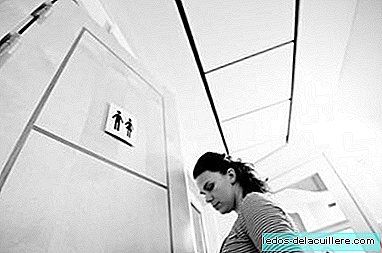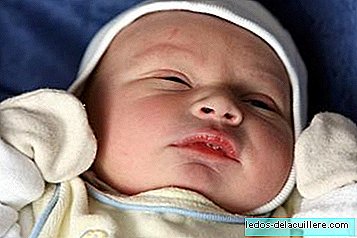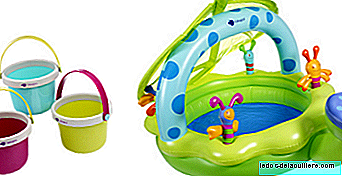
During pregnancy it is not only common for many women to have to go to the bathroom more frequently, some of them will also suffer small "leaks." Urinary incontinence during pregnancy is more common during the third trimester.
This is logical, since it is in the final stretch of pregnancy when the uterus and the fetus have grown considerably and put more pressure on the bladder. Incontinence usually occurs only at certain times: when you laugh, cough or sneeze.
That is to say, normally the pregnant woman loses urine when she makes an effort. It can also be while we perform the childbirth preparation exercises or while walking at a good pace.
Losses that are not urine: yes you have to worry
At the end of pregnancy we can control the losses if we suspect they are not urine. The smell can give us a pretty sure clue. There is a possibility that the leaks we notice are of amniotic fluid.
In this case we must go to the doctor immediately, because the loss of amniotic fluid means that the baby is in danger, since there has been rupture in the amniotic bag.
The amniotic sac is the membranous structure that must be hermetic, filled with liquid, to protect and wrap the fetus and the umbilical cord. The survival and well-being of the fetus depends largely on the fact that the bag is intact and no fluid is lost.
At the end of pregnancy there may be a ruptured bag ("breaking water"), which indicates that the birth has begun. But a premature breakage involves risks.
Amniotic fluid is distinguished from vaginal discharge because it is filamentous and urine because it does not have that characteristic smell of urine.

Prevent or control urine losses during pregnancy
There are certain tips that can help pregnant women prevent or control mild urinary incontinence. Here are some simple steps to follow.
Perform Kegel exercises to strengthen the pelvic floor. These exercises are very useful to overcome incontinence and strengthen the pelvic muscles for delivery and postpartum.
If you have verified that leaks occur when you cough or sneeze, try to cross your legs or perform Kegel exercises when you notice that you are going to do so. Also if you are going to lift weight, make a momentary effort that can cause losses.
Avoid irritating bladder foods and beverages such as coffee or other caffeinated beverages, citrus fruits, chocolate, tomatoes, alcohol (it is also totally prohibited for many other reasons)…
Take the necessary precautions to avoid urinary tract infections. Cystitis is more frequent during pregnancy, but we can prevent it precisely by avoiding foods mentioned in the previous point, maintaining proper hygiene or taking cranberry ...
Avoid constipation during pregnancy, as hard stools can press the bladder and make it more "vulnerable" to leaks. Introduce abundant foods rich in fiber and good hydration in your day to day. In this way we avoid making great efforts to evacuate, which can weaken the pelvic muscles.
Control weight gain, as excessive weight increases pressure on the bladder (among other risks to your health and that of the baby).
In short, you don't have to worry if you suffer slight losses of urine during pregnancy, they are normal. Which does not take away so that you try to prevent and control them: in this way you will feel more comfortable and protected. The chances of suffering postpartum leaks are also reduced if you do Kegel exercises.
Photos | Thinkstock On Babies and more | Incontinence in the mother












